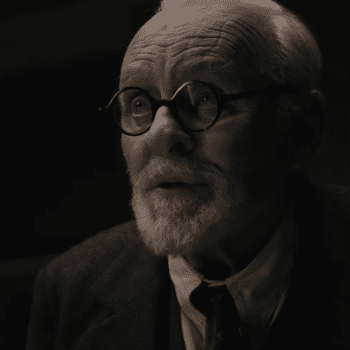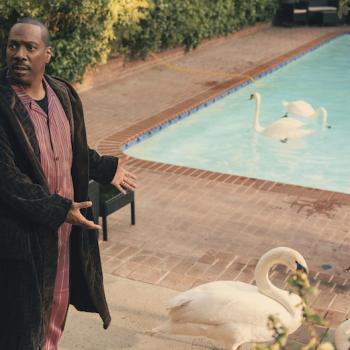TV has never been better, no question. The television landscape is so saturated with prestige shows right now that it’s turned into a veritable bog of quality—capable of sucking us in and forcing us to binge watch for weeks at a time.
Obviously, with all that television excellence bouncing around the telly, a few worthy shows are going to get snubbed around Emmy time. Only a few programs will find that secret elixir that’ll put them in the running for a shiny statuette come September.
This year, the Emmys made one thing clear: Shows with awards aspirations should steer clear of complex portrayals of faith.
Yes, religion—as in bad religion—had a bit of representation. Hulu’s dystopian story The Handmaid’s Tale scored 13 nominations (the first high-profile Emmy noms for the streaming network), and religion is a critical part of the story. Based on Margaret Atwood’s landmark novel, The Handmaid’s Tale takes place in a conservative Christian theocracy known as Gilead where women have no rights at all. Its crop of nominations include one for Best Drama and, of course, a Best Dramatic Actress nod for star Elisabeth Moss.
It’s a provocative book, a well-produced show and Atwood herself has said that her work wasn’t intended as a critique of Christianity, but rather a certain brand of religious extremism.
Still, the religion we see in Handmaid’s seems to feed into the myth that many Christians—those who might protest in front of Planned Parenthood clinics and vote a straight Republican ticket—would see Gilead as more of a utopia than a dystopia, which doesn’t do much to foster healthy, respectful dialogue. It feeds into a certain “us” v “them” dynamic that is all too common on both sides of the religious divide, I think.
Meanwhile, Hulu’s well-crafted (and far more spiritually nuanced) The Path was shut out. Sure, it’s hard to classify The Path as exactly a positive depiction of faith: It is, after all, centered around a strange, dangerous cult. But it grapples with some incredibly interesting questions: What is faith? Why are we drawn to it so? Can faith be helpful even when it’s not true? And I dig how the show treats its characters—even those most absorbed by the movement—with both respect and honesty.
Even more shocking, I think, was the almost complete exclusion of HBO’s The Leftovers.
It’s not like HBO was overlooked: The premium network snagged 111 noms, the most of any network or service, including 17 for the comedy Veep and 16 for Big Little Lies. But The Leftovers, a show that many critics have called one of television’s best (if not the best) and in its last season, was almost shut out, too. (It picked up one Emmy nom for Ann Dowd’s work as a guest star.)
Again, The Leftovers dares deal with the complexities of faith and religion. Based in the aftermath of a Rapture-like event, where two percent of the world simply up and vanished, The Leftovers begged us to ponder existential and eternal questions like, Why am I here? Or, more specifically, why am I still here? Though crass and profane and certainly challenging from a religious perspective, it embraced and mulled the mysteries that lie at the center of faith. And I really appreciated that.
FX’s The Americans wasn’t shut out of the Emmys. It picked up at least three, including one for each of its leads, Keri Russell and Matthew Rhys (as Soviet spies Elizabeth and Philip Jennings). But in a landscape littered with good-to-great television, The Americans is, I think, the best there is, and the fact that it wasn’t nominated for Best Drama (as it historically has been) is a bit of a travesty. Moreover, The Americans also has featured one of the most realistic, and strangely positive, portrayals of a Christian I’ve seen on television in a long time—that of Philip and Elizabeth’s daughter, Paige. While her journey of faith hasn’t been perfect, it feels real—a step beyond the caricatures we so often see on television and in movies.
It’s a shame.
James Poniewozik, television critic for The New York Times, once lamented that television didn’t deal with religion enough. Set aside the question of whether any given religion is true or not: Religion and faith, he argues, is interesting. It’s one of the biggest sources of motivation and change and conflict out there. The story possibilities are rich and endless. Why ignore it? Or worse, why reduce it to caricature?
The good news is that some shows are indeed daring to grapple with faith and religion in interesting, powerful and sometimes poignant ways. It’s too bad the Emmys won’t recognize them.













